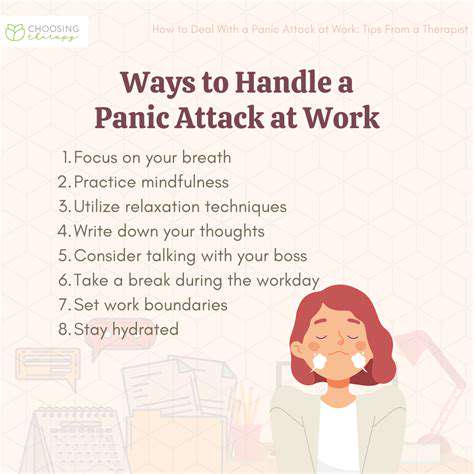Managing Anxiety in People: Tips for Support
Practical Techniques for Managing Anxiety Attacks

Prioritizing Tasks Effectively
When overwhelmed, start by sorting tasks into must-do and can-wait categories. The Eisenhower method (dividing tasks by urgency/importance) creates mental clarity during stressful moments. This sorting process alone can reduce anxiety by making challenges feel more manageable.
Urgent tasks scream for attention now, while important ones build your future. Recognizing this difference helps you invest energy where it matters most. Many find that writing down priorities eases the mental burden of remembering everything.
Time Blocking and Scheduling
Imagine your day as a series of appointment slots - this is time blocking in action. When you assign specific activities to fixed times, decision fatigue decreases. Your brain appreciates knowing from 10-11am I'll handle emails rather than constantly choosing what to do next.
A structured schedule acts like guardrails against anxiety's chaos. It's not about rigid control, but creating predictable patterns that calm the mind. Many successful individuals swear by this method for maintaining focus during stressful periods.
Delegation and Collaboration
Recognizing you don't have to do everything alone is powerful anxiety relief. Passing appropriate tasks to colleagues or family members creates breathing room. This isn't shirking responsibility - it's smart resource management.
Teamwork transforms overwhelming projects into shared journeys. When multiple minds tackle challenges together, solutions emerge that one person might miss. Clear communication about expectations prevents new stressors from forming.
Utilizing Project Management Tools
Visual tools like Trello or Asana create external brains to hold task details. Seeing everything laid out often reduces the panicked feeling of I'm forgetting something important. These systems provide comforting structure when internal thoughts feel scattered.
Maintaining Focus and Avoiding Distractions
Anxiety thrives in fragmented attention. Creating distraction-free zones and times allows deeper concentration. The Pomodoro method (25-minute focused bursts) works surprisingly well for anxious minds - the short commitment feels manageable.
Protecting your focus is self-care for the anxious mind. Each interruption resets your mental state, making calm focus harder to regain. Simple changes like phone-free hours can dramatically improve mental clarity.
Seeking Professional Support for Anxiety Management

Seeking Professional Help for Anxiety
When anxiety feels unmanageable, reaching out shows courage, not weakness. Therapists provide customized toolkits that friends or articles simply can't match. These professionals help untangle the knots in your thinking that maintain anxiety cycles.
Identifying the Root Causes
Anxiety often stems from multiple hidden sources - past experiences, current pressures, or biological factors. A skilled therapist helps map these connections like a detective solving a mystery. Understanding your personal anxiety blueprint allows targeted solutions rather than guesswork.
Developing Coping Mechanisms
Effective coping strategies resemble a well-stocked mental first aid kit. Techniques range from grounding exercises (like the 5-4-3-2-1 method) to cognitive reframing of worried thoughts. With practice, these tools become automatic responses that short-circuit anxiety spirals.
Understanding Different Types of Anxiety
Anxiety manifests uniquely - some experience sudden panic attacks, others constant background worry. Recognizing your specific pattern (like social anxiety vs generalized anxiety) guides effective treatment. Accurate diagnosis leads to precision treatment rather than one-size-fits-all approaches.
The Importance of a Supportive Environment
Recovery flourishes in nurturing environments. Support groups provide validation that you're not alone, while understanding friends offer safe spaces to decompress. Human connection acts as both buffer and healing balm for anxious minds.
Effective Treatment Strategies
Modern anxiety treatment offers multiple pathways - CBT restructures thought patterns, EMDR processes traumatic memories, while medication can rebalance brain chemistry when needed. The most effective plans often combine professional guidance with personal commitment to change.
Building Long-Term Well-being
True anxiety management resembles fitness training - regular practice creates resilience. Incorporating movement, nutrition, sleep hygiene and mindfulness creates biological defenses against stress. Sustainable mental health comes from daily small choices that compound over time.